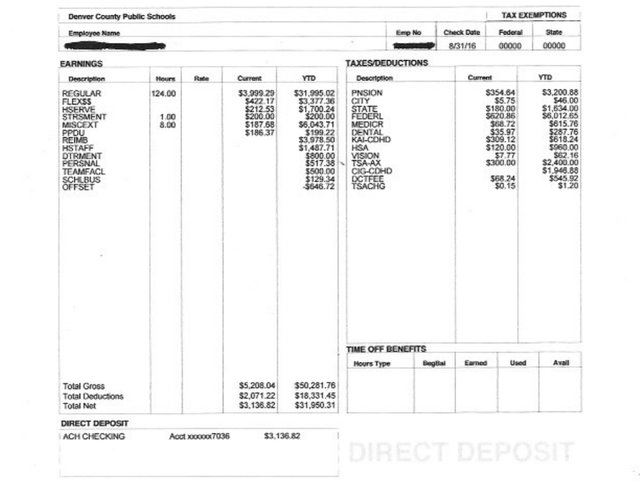Denver Teachers’ Strike Was a Rejection of Education ‘Reform’
Former
superintendent of Denver Public Schools Michael Bennet pushed
privatization measures as well as changes to the ProComp teacher pay
program.
“I
definitely drank the education reform kool-aid,” recalls Alex Nelson, a
Denver teacher who, along with over 5,300 fellow teachers and school
support staff, walked off the job earlier this month in a four-day
strike that resulted in the teachers having most of their demands met.
Now in his sixth year at Denver Public Schools, Nelson is at
Bryant-Webster Elementary where he teaches Math, Science, and Spanish to
third- and fourth-grade students. “I was convinced education was
failing and needed reform,” he recalls about his early years in the
profession.Back then, Denver schools were still basking in the glow of favorable national media coverage received during the leadership of superintendent, and now current U.S. Senator and expected presidential candidate, Michael Bennet. Under Bennet's direction from 2005-2009, Denver adopted a package of policies and programs favored by bipartisan education reformers, including measuring school and teacher performance by student test scores, closing low-performing schools, and opening competitive charter schools. After Bennett's tenure, district leadership transitioned to protege Tom Boasberg who just finished a ten-year term in office maintaining most of the same policies Bennet started.
“We were sold the notion that reforms were going to bring about a new era of better education for low-income kids and higher pay for teachers.”Denver’s approach to school governance has been much-ballyhooed by politically centrist advocates like David Osborne of the Progressive Policy Institute, the Clinton-era “ideas shop” that has been pushing the privatization of public services for more than thirty years. Beltway-based think tanks, on both the right and the left of the political spectrum, hail Denver as a model to “transform” the education of low-performing students. And the Brookings Institution named Denver the second-best of the nation's 100-plus largest school districts.
“The popular narrative of the time was about ‘reform.’” says Nelson. “And we were sold the notion that a new system of teacher compensation and other reforms were going to bring about a new era of better education for low-income kids and higher pay for teachers. It was going to be a breakthrough.”
The compensation system Nelson refers to is called ProComp, which linked teacher pay in part to student test scores and gave bonuses for things such as working in a high-poverty school or a hard-to-fill position. This year, one of the principal demands of the striking teachers was to scrap the system or at least drastically change it to resemble more of a traditional pay schedule where teachers can expect raises based on advanced degrees, additional responsibilities, and longevity.
ProComp is a creation of the education reform ideology which believes that the reason low-income students struggle in schools is because teachers aren’t sufficiently financially incentivized to boost student test scores. Also, schools with large percentages of low-income students tend to have less experienced teachers who turn over more often, and financial incentives might correct for that inequity.
Under ProComp, teachers got a bonus when their evaluations rate them “effective.” There were also schoolwide bonuses, bonuses for “exceeding expectations,” and other hurdles. (In 2015, the individual performance bonuses were modified so that only teachers in schools with the most struggling students could receive bonuses based on individual performance evaluations.)
But the experiences of Denver teachers show that the goals of basing teacher pay on student test scores and rewarding teachers for accepting challenging assignments are at odds with the reality teachers experience in their day-to-day work.
Nelson, who like most other Denver teachers initially agreed to ProComp, now recalls he started to feel like something was wrong when he was teaching at a “tough school,” which was rated “ineffective” based on the test scores of the students, who were mostly low-income, non-white children. He noticed that his colleagues who taught in wealthier schools that were rated “effective” got bigger bonuses. “If you taught at a tough school, you were incentivized to leave it,” he says.
The convoluted pay structure for teachers ensured that pay levels changed so dramatically from month to month that, “when you go to get a loan, it’s hard to tell a bank what your base salary is.”The district set aside money to give additional bonuses to teachers in “highest priority” schools, “but no one understands the metrics for determining the highest priority schools,” Nelson says. There are only thirty schools with this rating, and should the school improve enough to come off the list, it’s not clear what happens to the bonus money.
Also, Nelson says the compensation formula changed over time with fewer hoops and less money. “The salary schedule is not transparent to the typical teacher,” he says.
The result of this convoluted pay structure is that pay levels change so dramatically from month to month that, “when you go to get a loan, it’s hard to tell a bank what your base salary is,” he says.

A Denver Public Schools teacher pay stub from 2016 shows the complexity of teacher salaries in the district.
The attrition rate has recently declined somewhat, according to Nelson. “But it’s still too high,” he says. Consequently, schools resemble a “training ground for new teachers before they decide to go elsewhere.”
District officials point to increasing proficiency rates on student standardized tests as proof reforms are working, but community advocates charge that district assessments of school performance levels are inflated, and Denver continues to have one of the worst achievement gaps between white and non-white students in the country.
Research studies on the effects of Denver's teacher salary system have found mixed results at best, both on its overall effects on student achievement levels as measured by test scores, and on teacher attrition rates.
In their strike negotiations, Denver teachers argued successfully for base-pay increases, a more predictable salary schedule and to eliminate almost all pay-for-performance bonuses. And they compromised to accept the district’s proposal of a $3,000 annual bonus for working in hard-to-staff schools. They also won a demand to get a research study to examine the causes of teacher turnover in the district’s poorest schools. The agreement is expected to be ratified by a vote of the rank-and-file teachers.
“A 20 percent teacher turnover rate is not what’s best for kids,” Nelson says. He and his colleagues say smaller class sizes and more mental and physical health supports for students would go further than any monetary bonus to serve the interests of students and keep their teachers in the classroom.
To Nelson and his fellow teachers, for far too long, Denver has felt “like a lab for education reform, experimenting with a district that will rubber stamp anything presented to them by reform advocates.” They want the experiments to end.

No comments:
Post a Comment